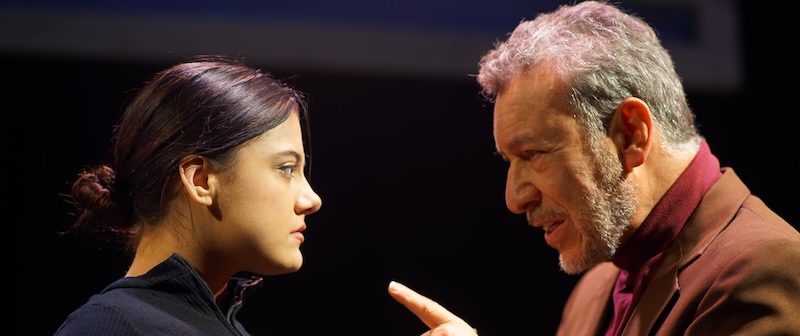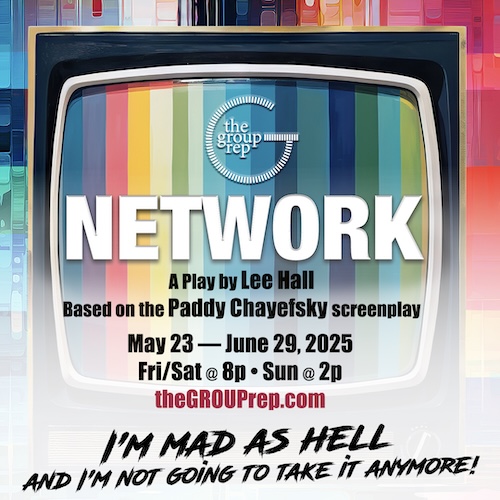
Blanca Isabella and Dennis Gersten (Photo by Lucia Ledoux)
Henry IV Part I
Reviewed by Steven Vargas
The Madnani Theater
Through November 24
Hal (Will Block), the Prince of Wales, is an absolute player and drunk. His name is in the tabloids, and his father, King Henry IV (Dawn Alden), has had enough. The Porters of Hellsgate Theatre Company’s production of Henry IV Part I transports Shakespeare’s play to today, but the reinterpretation adds nothing more than a dramatic newscast and a stack of magazines.
Contemporary Shakespeare is nothing new. In fact, a revisualized version of Romeo and Juliet currently takes The Circle stage on Broadway. But redirecting Shakespeare for a modern aesthetic isn’t easy, especially with a story like Henry IV where historical events drive the narrative forward. Director Margaret Shigeko Starbuck struggles to find the reason behind the choice. While the concept of tabloids offers a promising introduction to the world, the message and strength of Shakespeare’s story fall flat, leaving the individual performances to pick up the slack.
Henry IV Part I follows two main plots: King Henry’s struggling relationship with his son and a rebellion led by the Percys. Hal spends most of his time drinking with his friends in a seedy club in Eastcheap (a London neighborhood) with misfits and alcohol. He does this intentionally, aiming to be the fan favorite of the general public before returning to his seat with the nobility. Hotspur (Blanca Isabella) keeps the king at a distance, reminding him that he and his family were instrumental in his appointment. Tired of waiting for repayment, the Percys build an army of allies for their rebellion. While tensions between the newly reigning king and rebels of Wales and Scotland grow, the characters of Shakespeare’s Henry IV Part I slowly find their lives entangled into a story of honor and power.
The Porters of Hellsgate Theatre Company’s production has its spotlight moments. Starbuck directs moments of chaos incredibly well. In the Eastcheap club, the rambunctious activity with five to six people on stage at once is well-orchestrated. Characters climb down a ladder from the control booth and swoop in with set pieces to immerse the audience in a club scenario. Alongside fight choreographer and intimacy coordinator Jen Albert, the scenes in battle also offer a mesmerizing fast-paced performance.
Many roles are gender-bent with women playing King Henry, Blunt and Hotspur. As a result, there is an inherently queer side to the story, as seen in romantic scenes with the loved ones of Blunt and Hotspur. The casting decision adds a tender side to the play. Although this is clear on the surface, the language distorts the reality. For example, some characters refer to the king as “she” while others will opt for “he.” It makes the overall experience disorienting. A simple unified language can easily tighten up the director’s approach.
In this production, many supporting characters shine brighter than their leading ones. Alden struggles to embody Shakespeare’s language. This is particularly seen in Act 5, Scene 1 when she tries persuading the rebels to yield, saying, “Rebuke and dread correction wait on us / And they shall do their office.” With a line so powerfully put, her demeanor barely changes. She lacks urgency and connection to the words.
Thomas Bigley, who plays Falstaff, covers most of the language with slapstick comedy. While it works in quippy and humorous moments with Hal, it doesn’t on the battlefield. Starbuck’s direction puts a serious death center stage — but Falstaff’s humorous aversion to battle stage right diminishes the weight of the final moments of the play.
The performances of the rebels are the strongest, especially spotlight character Hotspur. Isabella has control over the language, steering each scene with ease and depicting, through her body language, how intimately she connects to the words. Howard Leder, who plays Glendower, makes the most of each short line he performs. He even steals a scene when he bops Isabella’s head with a rolled map alongside a quip. It’s specific and impactful. Jacob Athyal, another rebel character, also has few lines, yet immerses the audience with his vocal variety. He balances volume and textures in his performance, making his few scenes entrancing, even when standing still and immersed in the weight of battle.
In the end, the production whips out one last technological nod to the contemporary lens: a video camera. “Live” is displayed on a monitor as the royal figures kill the captured rebel leaders in a final moment of victory. This imparts a confusing message. The act of recording a murder at the hands of an authority figure is a weighted image, especially when in the context of today’s culture. It is unclear whether the creative team understands what they want it to mean. It is better to keep this story in the 1400s.
The Madnani Theater, 6760 Lexington Ave., Los Angeles. Plays in repertory, check website for schedule; thru Nov. 24. https://www.eventbrite.com/e/henry-iv-parts-1-2-tickets-1007972712517?aff=erellivmlt. Running time: Three hours with a 10-minute intermission.











